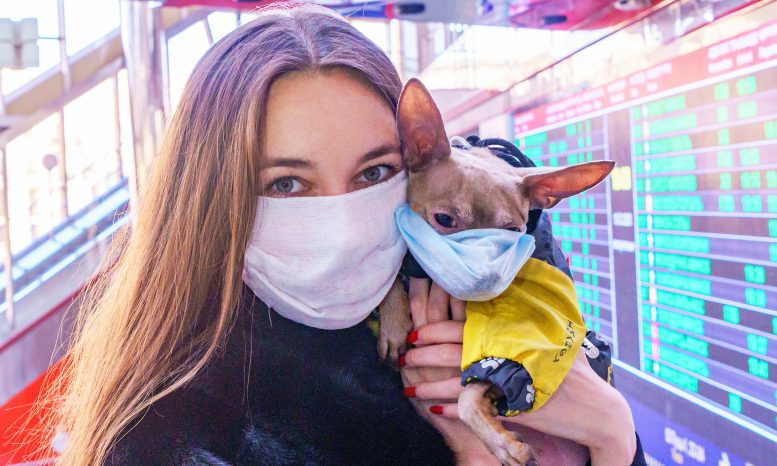
As evidence mounts for the possibility of SARS-CoV-2 infecting various animals, scientists at UCL say a global effort is needed to reduce the risk of the virus later returning to people.
In a comment piece for The Lancet Microbe, researchers write that if the virus becomes common in an animal population that lives near people, such as pets or livestock, there would be a risk that another outbreak could occur even if the virus is eradicated in people in the area.
The authors call for more research into which animals are susceptible to SARS-CoV-2, the virus causing the COVID-19 disease, and suggest implementing a surveillance program to regularly test animals that could pose the highest risks of transmission.
Co-author Professor Joanne Santini (UCL Structural & Molecular Biology) said: “There is increasing evidence that some animals can catch SARS-CoV-2 from people, and might subsequently transmit it to other people — but we don’t know just how much of a risk this is, as it’s an area of study that has not yet been prioritized.
“We need to develop surveillance strategies to ensure we don’t get taken by surprise by a large outbreak in animals, which could pose a threat not just to animal health but to human health as well.
“Virus transmission in animal populations could become irreversible if left unchecked, and may threaten the success of existing public health measures if people continue to catch the virus from an infected population of animals.”
The authors write that the immense scale of the COVID-19 pandemic compounds the possibility of sufficient animals becoming ‘reservoirs’ of the virus, which could be more likely than for past epidemics, such as the more contained SARS-CoV-1 outbreak in 2002-2003.
Professor Santini and co-author Professor Sarah Edwards (UCL Science & Technology Studies) reviewed evidence from case studies, experiments testing infection in small groups of animals, as well as laboratory and modeling studies describing likely infection mechanisms.
Modeling and lab studies suggest that SARS-CoV-2 could in theory be transmitted to numerous animals, based on findings that the spike protein on the virus attaches to host cells, using a protein that is found in many different species.
The research paper advises that, once scientists identify which animals could become infected, they then need to figure out whether they will become unwell or remain asymptomatic, and whether an infected individual is able to then transmit the virus to other animals or even to humans.
Notably, there have been recent cases in the Netherlands of farmed mink becoming infected with SARS-CoV-2, leading to two people catching the virus from these animals, in an outbreak that has led to thousands of mink being culled. The researchers say this example highlights not only the risk to human health, but also animal welfare concerns and potential loss of livelihoods in the agricultural sector.
Professor Edwards commented: “There’s an urgent need for widespread surveillance, by testing samples, preferably non-invasively, from large numbers of animals, particularly pets, livestock, and wildlife that are in close proximity to human populations. More laboratory experiments on small numbers of animals are unlikely to give us the evidence needed to be confident that certain species are entirely safe, making major surveillance work the only real option here.
“We need more information, at the same time as taking simple precautionary measures especially with species which have the potential to spread the virus rapidly in the wild. A robust risk assessment would also require reviewing our ability to manage an outbreak in those animals, namely our ability to isolate, protect, or contain different animals.”
Reference: “Host range of SARS-CoV-2 and implications for public health” by Joanne M Santini and Sarah J L Edwards, 18 June 2020, Lancet Microbe.
DOI: 10.1016/S2666-5247(20)30069-0
7 Comments
I really hope that scientists are wrong!
it is very difficult for pet owners at this time
Of course, I don’t know COVID-19 is transmitted to animals, including pets, even at the beginning of the pandemic, I decided with my pets to go to live in a country house. Here I have a small house with all the amenities and my own yard where my dogs can walk. However, there is one inconvenience, there are no veterinarians nearby. But I was able to find the PetOnBed https://petonbed.com/ this site where there are reviews and tips for pets from veterinarians. The information presented on this site stem from expert opinions of veterinarians, equipment manufacturers and many years of experience in pet care and training.
I am still debating the transmission of SARS-CoV-2 to pets and livestock/bloodstock. Reverse zoonosis in this case would be the transmission vector of this zoonotic virus. However it’s far more important at this stage to make sure that the pet is vaccinated according to a prescribed vaccination schedule. For example for a dog this https://shihtzuexpert.com/puppy-vaccination-schedule/ would be far more important than a a potential COVID-19 in the future.
I feel strongly about it and really like mastering more on this subject. If feasible, as you acquire experience, would you mind updating your blog with much more information. It is very helpful for me. thanks for sharing an amazing information.
You can also buy senior dog supplies but see to it that you know what the needed supplies are so you can entertain your dog. The guard dog supplies are specially designed to don them to look after your office or your home. There are so many ways in which you can have an advantage in keeping your pet dog but you need to be wise in caring for them because they are among the most friendly pets.
This will provide the highest level of readability and attract more attention.